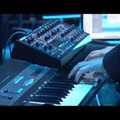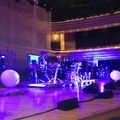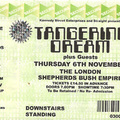 Magyar Narancs (Hungarian Orange), Hungary's most popular political and cultural weekly for the young people published a full-page article on the so-called Berlin-school phenomena in their Christmas 2006 issue. Narancs featured TD- and Klaus Schulze-reviews many times in its sixty-years history, and the author of these materials was István Bundula - expert of the topic - mostly, as this publication was also written by him. (I also got a page there for a review of the Shepherd's Bush Empire show in 1996.)
Magyar Narancs (Hungarian Orange), Hungary's most popular political and cultural weekly for the young people published a full-page article on the so-called Berlin-school phenomena in their Christmas 2006 issue. Narancs featured TD- and Klaus Schulze-reviews many times in its sixty-years history, and the author of these materials was István Bundula - expert of the topic - mostly, as this publication was also written by him. (I also got a page there for a review of the Shepherd's Bush Empire show in 1996.)
Here I provide you a quick and dirty translation of the original Hungarian text.
"It doesn't exist, but still it's here
The past and present of the Berlin-school
Though its name is established in classifying electronic music, the artist themselves are finding this aproach stupid. Anyway, today's stars benefitted from this style very much.
The avantgarde music of the 60s and 70s in Germany has much more colour and it's not fair to tighten it to its most popular names, Tangerine Dream and Klaus Schulze, or the Dusseldorf-based Kraftwerk. There were so many bands who share a common thing: the musical experimentation - and, at that time it was logically ended up dealing with synthetic sound sources. The Germans were not the first to employ them but they were the very first who used them excusively.
Musicians oriented in many directions like Can-founder Holger Czukay, TD's Edgar Froese, Kraftwerk's Ralf Hütter or Manuel Göttsching from Ash Ra Tempel had the common experience of trying to express themselves with the old rock and roll and blues but it didn't satisfied them. The musical vitality and and diversity of the time and place came from this fact - searching for a new identity. All of them tried to engaged with contemporary music and with minimalist structures more or less. (Schulze said once: I tried to mix Stockhausen and Chuck Berry in my music.) The new and original music style was mixed from these elements (free jazz and psychedelic music were there also), and built very long, sometimes unbearably long musical pieces. The improvised not only in live concerts (TD often determined the musical key they played just right before the beginning of the show - the rest were pure intuition), but at the studio also. The early Can, the Agitation Free and Tangerine Dream quickly became the favourite bands of the West-Berlin hippi community, but their production based on improvisation didn't meet the public expectations very often. "They threw apples and banana to force us finishing. And suddenly a small box landed on m keyboard. Do you know what a dirty work is to clean the keys from the jam?" - said Froese about a less-successful Parisian concert.
TD, Klaus Schulze and Can are well-known in Hungary, and the most popular is Kraftwerk no doubt. But Agitation Free, Ash Ra Tempel and Cluster got very few mentions. But Agitation Free's bizarre world had effect not only on TD but on the new wave of England later also (and perhaps on Hungary's Balaton and Trabant bands). Without Göttsching's experiments Klaus Schulze would not be the same like now and Cluster's founders (Roedelius, Moebius, Schnitzler) played ambient which simply did not exist then: Brian Eno's non-music revolution based clearly on Cluster (Eno even made recordings with Cluster and with the members themselves).
When stars of today's electronic music respect the big heroes they have reason for it twice: they got ready-to-use musical solutions, ideas, harmonies and rhythms, and second for the technical innovations, which were done by the predecessors also, in contribution with the new electronic musical instrument industry.
And what are the heroes doing now? Many of them are working in the soundtrack business like Michael Hoenig from Agitation Free and AF's drummer and later TD's basic man Christopher Franke. Manuel Göttsching and Steve Jolliffe (played in TD in two eras) did not left the original field completely: Steve's latest live recording of minimalist music and Jolliffe's characteristic flute work is one of the best output of the style in 2006 (a speciality: Jolliffe incorporated a 4-minutes recording of TD from 1967 in the first track). Czukay, Schnitzler and Roedelius are making music for contemporary theatre and art productions. Roedelius has a new double-CD compilation so if anybody is interested in one of the most original man in electronic music just try it (Works 1968-2005, Groenland Records 2006). Klaus Schulze works in a very consistent quality since the very beginning - he had a new record called Moonlake released 2006 but his main project is publishing old, previously unreleased materials. Edgar Froese (with Tangerine Dream) pours on the recordings - but most of them are easy exercises, duplications or middle-quality experimentations. A good example is his new maxi called 40 Years Roadmap to Music. Probably he has no more idea - as in the Berlin-school style is almost empty now. But its past is not only a curiosity of the musical history because the best pieces still has the inimitable magic.






Last comments